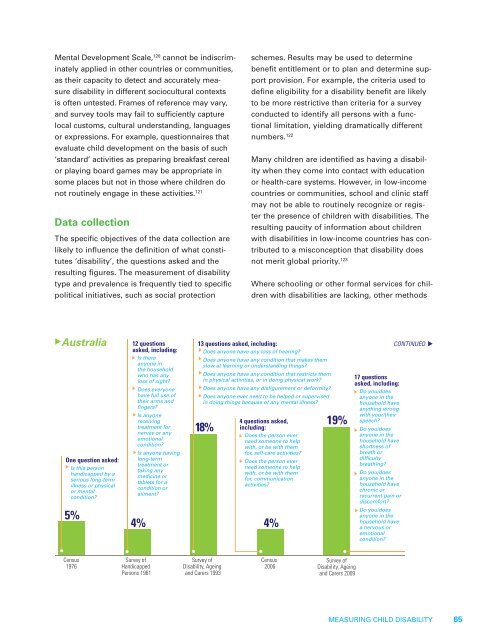Children with Disabilities
Children with Disabilities
Children with Disabilities
Create successful ePaper yourself
Turn your PDF publications into a flip-book with our unique Google optimized e-Paper software.
Mental Development Scale, 120 cannot be indiscriminately<br />
applied in other countries or communities,<br />
as their capacity to detect and accurately measure<br />
disability in different sociocultural contexts<br />
is often untested. Frames of reference may vary,<br />
and survey tools may fail to sufficiently capture<br />
local customs, cultural understanding, languages<br />
or expressions. For example, questionnaires that<br />
evaluate child development on the basis of such<br />
‘standard’ activities as preparing breakfast cereal<br />
or playing board games may be appropriate in<br />
some places but not in those where children do<br />
not routinely engage in these activities. 121<br />
Data collection<br />
The specific objectives of the data collection are<br />
likely to influence the definition of what constitutes<br />
‘disability’, the questions asked and the<br />
resulting figures. The measurement of disability<br />
type and prevalence is frequently tied to specific<br />
political initiatives, such as social protection<br />
uAustralia 12 questions<br />
asked, including:<br />
13 questions asked, including:<br />
Does anyone have any loss of hearing?<br />
CONTINUED u<br />
Is there<br />
anyone in<br />
the household<br />
who has any<br />
loss of sight?<br />
Does everyone<br />
have full use of<br />
their arms and<br />
fingers?<br />
Does anyone have any condition that makes them<br />
slow at learning or understanding things?<br />
Does anyone have any condition that restricts them<br />
in physical activities, or in doing physical work?<br />
Does anyone have any disfigurement or deformity?<br />
Does anyone ever need to be helped or supervised<br />
in doing things because of any mental illness?<br />
17 questions<br />
asked, including:<br />
Do you/does<br />
anyone in the<br />
household have<br />
anything wrong<br />
One question asked:<br />
Is this person<br />
handicapped by a<br />
serious long-term<br />
illness or physical<br />
or mental<br />
condition?<br />
Is anyone<br />
receiving<br />
treatment for<br />
nerves or any<br />
emotional<br />
condition?<br />
Is anyone having<br />
long-term<br />
treatment or<br />
taking any<br />
medicine or<br />
tablets for a<br />
condition or<br />
ailment?<br />
18%<br />
4 questions asked,<br />
including:<br />
Does the person ever<br />
need someone to help<br />
<strong>with</strong>, or be <strong>with</strong> them<br />
for, self-care activities?<br />
Does the person ever<br />
need someone to help<br />
<strong>with</strong>, or be <strong>with</strong> them<br />
for, communication<br />
activities?<br />
19%<br />
<strong>with</strong> your/their<br />
speech?<br />
Do you/does<br />
anyone in the<br />
household have<br />
shortness of<br />
breath or<br />
difficulty<br />
breathing?<br />
Do you/does<br />
anyone in the<br />
household have<br />
chronic or<br />
recurrent pain or<br />
discomfort?<br />
5%<br />
4%<br />
4%<br />
Do you/does<br />
anyone in the<br />
household have<br />
a nervous or<br />
emotional<br />
condition?<br />
Census<br />
1976<br />
Survey of<br />
Handicapped<br />
Persons 1981<br />
Survey of<br />
Disability, Ageing<br />
and Carers 1993<br />
schemes. Results may be used to determine<br />
benefit entitlement or to plan and determine support<br />
provision. For example, the criteria used to<br />
define eligibility for a disability benefit are likely<br />
to be more restrictive than criteria for a survey<br />
conducted to identify all persons <strong>with</strong> a functional<br />
limitation, yielding dramatically different<br />
numbers. 122<br />
Many children are identified as having a disability<br />
when they come into contact <strong>with</strong> education<br />
or health-care systems. However, in low-income<br />
countries or communities, school and clinic staff<br />
may not be able to routinely recognize or register<br />
the presence of children <strong>with</strong> disabilities. The<br />
resulting paucity of information about children<br />
<strong>with</strong> disabilities in low-income countries has contributed<br />
to a misconception that disability does<br />
not merit global priority. 123<br />
Where schooling or other formal services for children<br />
<strong>with</strong> disabilities are lacking, other methods<br />
Census<br />
2006<br />
Survey of<br />
Disability, Ageing<br />
and Carers 2009<br />
MEASURING CHILD DISABILITY<br />
65


